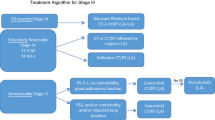Abstract
Introduction
EGFR (epidermal growth factor receptor) mutant NSCLC (non-small cell lung carcinoma) comprises 35–40% of cases in the Asian NSCLC cohort, compared to 15–20% in the rest of the world. Improved response rates have been observed in terms of PFS (progression-free survival) and ORR (overall response rate) when treated with EGFR TKIs (tyrosine kinase inhibitors). However, resistance eventually ensues regardless of the generation of TKI used. Preclinical studies have reported that PDL1 (programmed death ligand 1) is a downstream target of EGFR and is interposed by IL-6/JAK/STAT3 (interleukin-6/Janus kinase/signal transducer and activator of transcription 3), NF-κB (nuclear factor kappa beta), and p-ERK1/2/p-c-Jun pathways. Hence, it may potentially be repressed by EGFR TKIs. In this retrospective exploratory analysis, we studied whether PDL1 expression affects efficacy of EGFR TKIs and clinical outcome in patients with untreated metastatic EGFR-mutated lung adenocarcinoma.
Methods
This single-center retrospective, exploratory analysis was performed between January 2015 and December 2019. Among 1350 cases of NSCLC, 470 were EGFR mutant, of which PDL1 expression testing was done in 193 patients who were included in this study.
Results
Median age was 60 years (range 24–87 years). A total of 116 patients (60.1%) had inframe deletion in exon 19, 52 (26.9%) had L858R, and 25 (13%) had uncommon mutations. The number of patients with PDL1 tumour proportion score (TPS) < 1% was 109 (56.5%); 1–49%, 57 (29.5%); and ≥ 50%, 27 (14%). Comparing clinical characteristics among various PDL1 groups, there were no statistically significant correlations obtained. However, patients with PDL1 > 50% were smokers, and showed a trend for higher disease burden at diagnosis. Median PFS of PDL1 < 1% was 10.14 months, compared to 9.4 months in the PDL1 > 1% group; however, the values did not reach statistical significance.
Conclusion
The current study was an exploratory retrospective study; however, the results add to the growing body of evidence that PDL1 expression in EGFR-mutated NSCLC does not have any prognostic significance. Also the efficacy of EGFR TKIs is not influenced by variations in PDL1 TPS.


Similar content being viewed by others
References
Yang JCH, Sequist LV, Mok TS, Schuler M. Clinical activity of afatinib in patients with advanced non-small-cell lung cancer harbouring uncommon EGFR mutations: a combined post-hoc analysis of LUX-Lung 2, LUX-Lung 3, and LUX-Lung 6. Lancet Oncol. 2015;16(7):830–8.
Prabhash K, Advani SH, Batra U, et al. Biomarkers in non-small cell lung cancers: indian consensus guidelines for molecular testing. Adv Ther. 2019;36(4):766–85. https://doi.org/10.1007/s12325-019-00903-y.
National Comprehensive Cancer Network. Non-small cell lung cancer (Version3.2020). https://www.nccn.org/professionals/physician_gls/pdf/nscl.pdf. Published 2020. Accessed 10 Apr 2020.
Chen N, Fang W, Zhan J, et al. Upregulation of PD-L1 by EGFR activation mediates the immune escape in EGFR-driven NSCLC implication for optional immune targeted therapy for NSCLC. JTO Acquis. 2015;10(6):910–23. https://doi.org/10.1097/JTO.0000000000000500.
Bassanelli M, Sioletic S, Martini M, Giacinti S, Immunotherapy A. Heterogeneity of PD-L1 expression and relationship with biology of NSCLC. Anticancer Res. 2018;3796:3789–96. https://doi.org/10.21873/anticanres.12662.
Schwartz LH, Litière S, De Vries E, et al. RECIST 11—update and clarification: from the RECIST Committee. Eur J Cancer. 2017. https://doi.org/10.1016/j.ejca.2016.03.081.RECIST.
Brown H, Vansteenkiste J, Nakagawa K, et al. Programmed cell death ligand 1 expression in untreated EGFR mutated advanced NSCLC and response to osimertinib versus comparator in FLAURA. J Thorac Oncol. 2019;15(1):138–43. https://doi.org/10.1016/j.jtho.2019.09.009.
Azuma K, Ota K, Kawahara A, et al. Association of PD-L1 overexpression with activating EGFR mutations in surgically resected nonsmall-cell lung cancer. Ann Oncol. 2014;25(10):1935–40. https://doi.org/10.1093/annonc/mdu242.
Zhang N, Zeng Y, Du W. The EGFR pathway is involved in the regulation of PD-L1 expression via the IL-6/JAK/STAT3 signaling pathway in EGFR-mutated non-small cell lung cancer. Int J Oncol. 2016;3(15):1360–8. https://doi.org/10.3892/ijo.2016.3632.
Lee JM, Lee SH, Chang, et al. Positive PD-L1 expression is associated with unfavorable clinical outcome in EGFR-mutated lung adenocarcinomas treated with EGFR-TKIs. Eur Respir J. 2019;54:PA367.
Garon EB, Hellmann MD, Rizvi NA, Carcereny E, Leighl NB. Five-year overall survival for patients with advanced non-small-cell lung cancer treated with pembrolizumab: results from the phase I KEYNOTE-001 study abstract. J Clin Med. 2019;37(28):2518–28.
Jin Y, Shen X, Pan Y, et al. Correlation between PD-L1 expression and clinicopathological characteristics of non-small cell lung cancer: a real-world study of a large Chinese cohort. J Thorac Dis. 2019;1(11):4591–601. https://doi.org/10.21037/jtd.2019.10.80.
Su S, Dong Z, Xie Z, Yan L. Strong programmed death ligand 1 expression predicts poor response and de novo resistance to EGFR tyrosine kinase inhibitors among NSCLC patients with EGFR mutation. J Thorac Oncol. 2018;13(11):1668–75. https://doi.org/10.1016/j.jtho.2018.07.016.
Zhang M, Li G, Wang Y, Wang Y, Zhao S, Haihong P. PD-L1 expression in lung cancer and its correlation with driver mutations: a meta-analysis. Sci Rep. 2016;2017:1–10. https://doi.org/10.1038/s41598-017-10925-7.
Yoon BW, Chang B, Lee SH. High PD-L1 expression is associated with unfavorable clinical outcome in EGFR-mutated lung adenocarcinomas treated with targeted therapy. Onco Targets Ther. 2020;13:8273–85. https://doi.org/10.2147/OTT.S271011.
Acknowledgements
Funding
No funding or sponsorship was received for this study or publication of this article.
Authorship
All named authors meet the International Committee of Medical Journal Editors (ICMJE) criteria for authorship for this article, take responsibility for the integrity of the work as a whole, and have given their approval for this version to be published.
Disclosures
All authors (Ullas Batra, Mansi Sharma, Shrinidhi Nathany, Abhishek Bansal, Sunil Pasricha, Parveen Jain, Anurag Mehta, Harkirat Singh) have nothing to disclose.
Compliance with Ethics Guidelines
This study has been approved by the Rajiv Gandhi Cancer Institute and Research Centre Institutional Review Board (Res/SCM/26/2018/21) and has been carried out in compliance with the declaration of Helsinki.
Data Availability
The datasets generated during and/or analyzed during the current study are available from the corresponding author on reasonable request.
Author information
Authors and Affiliations
Corresponding author
Rights and permissions
About this article
Cite this article
Batra, U., Sharma, M., Nathany, S. et al. EGFR and PDL1: A Match (Not) Made in Heaven—A Real-World Retrospective Analysis of PDL1 Expression in EGFR-Mutated NSCLC. Adv Ther 38, 1791–1800 (2021). https://doi.org/10.1007/s12325-021-01655-4
Received:
Accepted:
Published:
Issue Date:
DOI: https://doi.org/10.1007/s12325-021-01655-4




